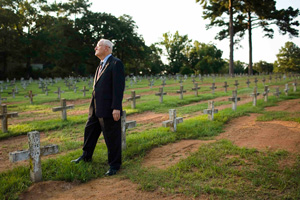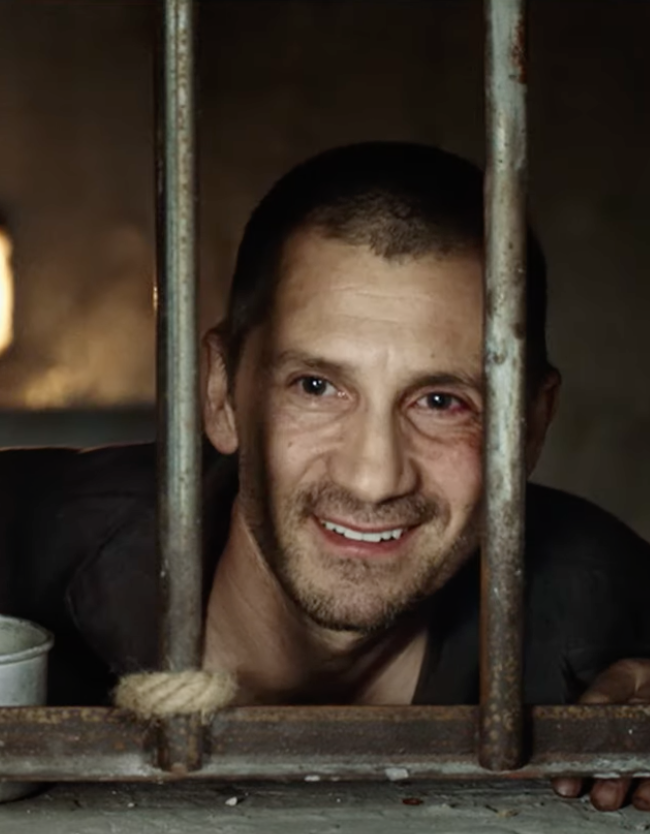(At the Death House Door premieres tonight on IFC at 9pm E/P. Go here for more details.)
How does one make an even-handed film about an issue as divisive as the death penalty? In the case of At the Death House Door, one doesn’t. Two do. Acclaimed documentarians Steve James and Peter Gilbert co-direct this absorbing and complex exploration into one of American society’s most impassioned moral, ethical, and political debates. A virtually impossible task, it seems, but in Pastor Carroll Pickett, James and Gilbert have found a perfect human conduit between both sides of the argument. Pickett’s intimate role in the Texas death penalty system forced him to see the situation from both the outside-in and the inside-out. Now, thanks to James and Gilbert, so can we.
In devoting his life to the service of God, Pastor Carroll Pickett never expected that his calling would lead him to death row, for at that time there was no death row. But when Texas initiated the death penalty by lethal injection, Pickett received the most difficult task of all: spend the last day with these convicts and make sure they walked into death quietly. Although it spawned nearly crippling feelings of guilt and remorse, Pickett sucked it up and did his job. As a way of coping with his inner turmoil, he recorded post-execution audio accounts of his days spent with these men. In total, Picket made ninety-five tapes over fifteen years.
 While James and Gilbert cover an ambitious range of content in only ninety-six minutes—Pickett’s own life story; the history of the death penalty in Texas; the current, ongoing quest to abolish capital punishment on a national level—they use the story of Carlos DeLuna to bring a much-needed dose of gray to a topic that many viewers would deem black-and-white. DeLuna was executed in 1989 for a murder he almost certainly did not commit. More than any other, Pickett expresses extreme remorse for this execution in particular, for he felt in his heart that they were condemning the wrong man. This sentiment, coming from an individual who had previously expressed pleasure in watching another convict die and who appears to be a supporter of the law, creates a rift in viewer’s expectations and adds deeper shades of gray to the argument. James and Gilbert’s ultimate question, which they ask with subtlety and nobility through Pickett’s wizened eyes, is this: even if there was only one wrongful death out of a thousand, isn’t that enough of an unforgivable tragedy to make us revoke this irrevocable law?
While James and Gilbert cover an ambitious range of content in only ninety-six minutes—Pickett’s own life story; the history of the death penalty in Texas; the current, ongoing quest to abolish capital punishment on a national level—they use the story of Carlos DeLuna to bring a much-needed dose of gray to a topic that many viewers would deem black-and-white. DeLuna was executed in 1989 for a murder he almost certainly did not commit. More than any other, Pickett expresses extreme remorse for this execution in particular, for he felt in his heart that they were condemning the wrong man. This sentiment, coming from an individual who had previously expressed pleasure in watching another convict die and who appears to be a supporter of the law, creates a rift in viewer’s expectations and adds deeper shades of gray to the argument. James and Gilbert’s ultimate question, which they ask with subtlety and nobility through Pickett’s wizened eyes, is this: even if there was only one wrongful death out of a thousand, isn’t that enough of an unforgivable tragedy to make us revoke this irrevocable law?
As for Pickett’s own personal stance, James and Gilbert reveal this gradually, over the course of the film, and it would be inconsiderate and inappropriate to disclose that stance here. How it is shared is another matter, for this is where James and Gilbert show their true skill as storytellers. At first, Pickett’s children appear to help flesh out his life story, but an unexpectedly revealing gathering gives them (and, in turn, us) Pickett’s ultimate verdict. This scene is just one of many that adds a richer layer of human recognition to the film, and is yet another moment that should drive both proponents and opponents into a more compassionate state of deliberation.
As a modern-day subject looking back on his past, Pickett appears to be a supremely reliable narrator. Coupled with his family’s insights and a staggering assortment of archival footage that James and co-editor Aaron Wickenden have brilliantly woven into the film, At the Death House Door brings the past to life even more fully. But it is in the audio accounts where James and Gilbert have tapped into something much more profound. Chills arise as we watch an older man listening to his younger self tell everything that happened the day he led another human being to his death. It is a prophecy fulfilled, that solitary, wounded voice, and to see Pickett now, listening to these tapes, we understand that his wounds might never heal. At the Death House Door is an admirable, vital contribution to this stormy, ceaseless debate.
— Michael Tully











